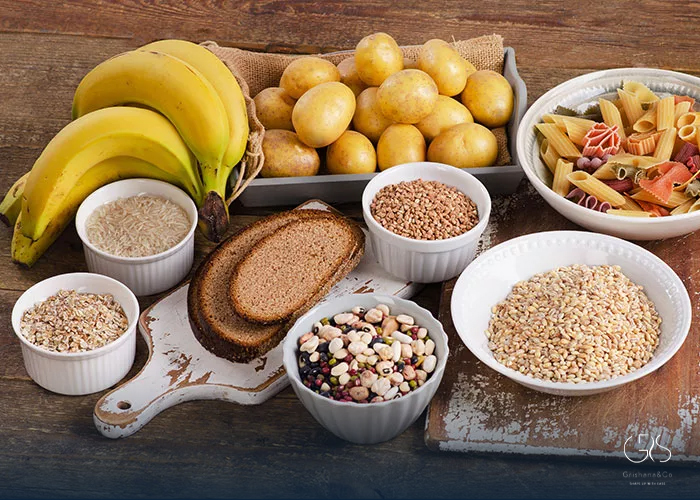In today’s society, the issue of weight gain and obesity has become a growing concern, especially among individuals approaching midlife. With sedentary lifestyles and poor dietary habits becoming increasingly common, the importance of making healthier food choices cannot be understated. One key aspect of a balanced diet that can help prevent midlife weight gain is the consumption of whole grains and non-starchy vegetables.
The Role of Whole Grains in Weight Management
Whole grains are an essential component of a healthy diet due to their high fiber content, which promotes satiety and aids in digestion. Research has shown that individuals who consume more whole grains are less likely to gain weight over time compared to those who consume refined grains (Harvard T.H. Chan School of Public Health). Whole grains such as brown rice, quinoa, and whole wheat contain essential nutrients and are digested more slowly, resulting in sustained energy levels and reduced cravings for unhealthy snacks.
A study published in the American Journal of Clinical Nutrition found that a higher intake of whole grains was associated with lower levels of abdominal fat, a common problem area for weight gain in midlife. By incorporating whole grains into one’s diet, individuals can not only manage their weight but also reduce the risk of developing chronic diseases such as diabetes and heart disease.

Non-Starchy Vegetables and Weight Control
Non-starchy vegetables, including leafy greens, peppers, and broccoli, are low in calories and high in essential vitamins and minerals. These vegetables are also rich in fiber, which aids in digestion and provides a feeling of fullness without excess calories. According to the Centers for Disease Control and Prevention (CDC), incorporating a variety of non-starchy vegetables into meals can help individuals maintain a healthy weight and reduce the risk of obesity-related complications.
A comprehensive analysis conducted by the World Health Organization (WHO) concluded that diets high in non-starchy vegetables are associated with a lower body mass index (BMI) and a reduced risk of weight gain. By prioritizing the consumption of non-starchy vegetables, individuals can increase their nutrient intake, support healthy digestion, and effectively manage their weight as they approach midlife.
Carb Quality and Midlife Weight Management
While carbohydrates have often been demonized in mainstream media, it is important to distinguish between high-quality and low-quality carbs. The quality of carbohydrates plays a significant role in weight management and overall health, especially as individuals age. High-quality carbs, such as whole grains, fruits, and vegetables, are minimally processed and retain their natural fiber and nutrients. In contrast, low-quality carbs, including sugary snacks, white bread, and pastries, are often high in refined sugars and lead to rapid spikes in blood sugar levels.
(For information on how carbs impact weight, I suggest reading this article.)
A study published in the Journal of the American Medical Association (JAMA) reported that diets rich in high-quality carbs were associated with a lower risk of obesity and weight gain over time (JAMA). Consuming nutritious carbs can help regulate blood sugar levels, prevent energy crashes, and support sustainable weight loss efforts. By focusing on the quality of carbs consumed, individuals can make informed choices that benefit both their physical health and overall well-being.

Creating a Balanced Diet Centered on Nutritious Carbs
To combat midlife weight gain and promote overall health, it is crucial to create a balanced diet centered on nutritious carbohydrates such as whole grains and non-starchy vegetables. By incorporating a variety of whole grains like quinoa, barley, and oats into meals, individuals can increase their fiber intake, boost satiety, and regulate blood sugar levels. Pairing whole grains with lean proteins and non-starchy vegetables can create balanced and satisfying meals that support weight management goals.
Furthermore, individuals can experiment with different cooking methods and recipes to make whole grains and vegetables more appealing and enjoyable. Grilled vegetables, vegetable stir-fries, and whole grain salads are just a few examples of delicious and nutritious meals that can aid in weight control and provide essential nutrients. By taking a proactive approach to meal planning and preparation, individuals can establish healthy eating habits that will benefit them well into midlife and beyond.

Conclusion
In conclusion, the consumption of whole grains and non-starchy vegetables plays a vital role in preventing midlife weight gain and promoting overall health. By prioritizing high-quality carbs in the diet, individuals can effectively manage their weight, reduce the risk of chronic diseases, and sustain energy levels throughout the day. Creating a diet centered on nutritious carbohydrates not only supports physical well-being but also contributes to long-term wellness and vitality.
Through education, awareness, and proactive dietary choices, individuals can empower themselves to make positive changes that will enhance their quality of life as they age. By embracing whole grains, non-starchy vegetables, and other nutrient-dense foods, individuals can take control of their health and well-being, setting the foundation for a healthier and more fulfilling future.
Sources
- Harvard T.H. Chan School of Public Health, Whole Grains
- American Journal of Clinical Nutrition, Whole grain and body weight changes in apparently healthy adult
- Centers for Disease Control and Prevention, Healthy Habits: Fruits and Vegetables to Manage Weight










